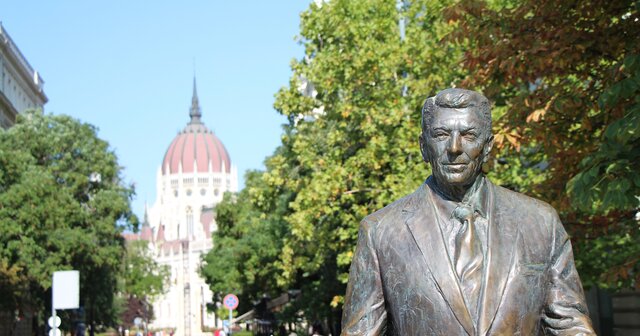

This article originally appeared in The Detroit News September 10, 2024.
The movie “Reagan” contains a scene from Ronald Reagan’s boyhood. He's seen running from three other boys, into his yard and up on the front porch where his mother meets him. The three bullies fall back, lurking down by the street.
“Scaredy cat! Mama’s boy! Get over here!” they taunt.
“Is that the boy that’s been threatening you?” Mrs. Reagan asks.
“Every day,” says young Reagan, as he starts to walk into the house.
His mother stops him. “He’ll be there tomorrow, too,” she says. “That’s what bullies do until you stand up to them.” She steps inside and closes the front door, leaving her son alone on the porch. Reagan drops his schoolbooks, takes off his glasses and walks toward the bullies.
Nelle Reagan’s guidance is the thread that runs throughout the film.
Time and again, Ronald Reagan summoned a clarity of purpose to stand up against someone or something. The movie shows Reagan as the Screen Actors Guild president, confronting rival union leader (and communist agitator) Herb Sorrell. While governor of California, Reagan made the controversial decision to call in the National Guard on lawbreaking Berkeley protestors. President Reagan fired the air traffic controllers who engaged in an illegal strike.
The most dramatic scene: As much as Reagan wanted a nuclear arms agreement with the Soviet Union, when Mikhail Gorbachev insisted the United States abandon its missile defense system, Reagan walked out.
“Reagan,” directed by Sean McNamara, is in theaters, and is based on “The Crusader: Ronald Reagan and the Fall of Communism,” by Paul Kengor, a historian and professor at Grove City College. (Kengor is also an adjunct scholar with the Mackinac Center).
Dennis Quaid, who plays Reagan, exudes the 40th president’s sunny optimism and charm. Penelope Ann Miller portrays Nancy Reagan’s love and loyalty. Jon Voight plays a fictional KGB agent — based on a compilation of people — assigned to study Reagan as his political star rose.
Two moments of fine acting stood out.
First, Reagan’s age was a concern during his 1984 reelection campaign. In the second debate with Democratic opponent Walter Mondale, Reagan famously pledges not to exploit Mondale’s “youth and inexperience.” In the movie, Reagan delivers the devastating line and then, while Mondale and the audience laugh, smiles to himself, knowing the election outcome is sealed.
Second, near the end of the movie, Secret Service agent and horseback riding companion John Barletta tells Reagan they must stop riding because of Reagan’s failing health. For 30 seconds of silence Quaid’s face registers confusion, then defiance, then resignation, then good cheer.
The movie includes subtle facts about Reagan. He was a reader and deep thinker, and we see him reading “Witness,” by former communist spy Whittaker Chambers. Reagan loved Rancho del Cielo, the ranch near Santa Barbara he and Nancy bought toward the end of his governorship. I have visited that ranch; the movie captures its simplicity, seclusion and peace. The movie shows how Reagan respected and earned the respect of his opponents, whether it was House Speaker Tip O’Neill or Gorbachev.
The film critics will hate “Reagan," as the movie’s unabashed admiration for the man may strike some viewers as too saccharine-sweet.
The biggest drawback is the movie tries to accomplish too much. Instead of following a traditional story arc, it strings together the important episodes of Reagan’s colorful life. The scenes are jammed together, and new characters rapidly rotate in and out.
It is not clear what the director wants us to know. Is this a biographical treatment of Reagan’s life? The Ronnie and Nancy love story? An assessment of his legacy? The story of the fall of the Soviet Union? With so much powerful material, one wonders if it should have been a multi-part series like "The Crown."
Nevertheless, it's a worthwhile movie.
Permission to reprint this blog post in whole or in part is hereby granted, provided that the author (or authors) and the Mackinac Center for Public Policy are properly cited.
Get insightful commentary and the most reliable research on Michigan issues sent straight to your inbox.

The Mackinac Center for Public Policy is a nonprofit research and educational institute that advances the principles of free markets and limited government. Through our research and education programs, we challenge government overreach and advocate for a free-market approach to public policy that frees people to realize their potential and dreams.
Please consider contributing to our work to advance a freer and more prosperous state.

Donate | About | Blog | Pressroom | Publications | Careers | Site Map | Email Signup | Contact